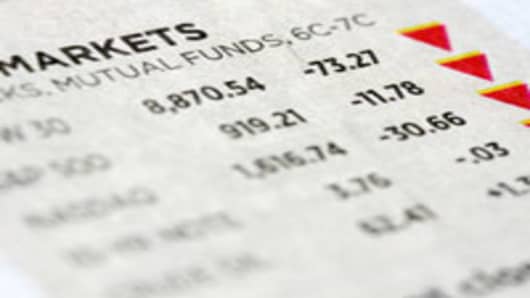Nothing tells the story of August like the data. The DJIA is off by 4.7 percent month to date but the losses elsewhere show just what a difficult month it has been. Germany's DAX is off 18 percent, the CACin Paris is lower by 11 percent and the gold bugs have had an amazing few weeks with the precious metal up 13 percent.
Volatility has been huge with multiple 500-plus moves in the Dow and those working in the financial services industry unable to switch off during summer holidays as fears over economic growth, the US debtdowngrade and the slow motion car crash that is the European debt crisis.
The month started with investors relieved that congress had finally agreed to raise the US debt ceiling, but attention soon turned to the prospect of America losing its AAA rating.
Analysts were relieved and told CNBC that things could begin to improve following the debt ceiling deal, but this did not prove to be the case.
Sentiment turned negativewhen S&P followed through on a threat to downgrade America’s credit rating.
One day after major losses on the Dow, S&P made its move late on Friday August 5. Then, despite the likes of Jim Rogers telling investors not to sell into a selling climax, things got really interesting.
Following a 635 point selloff on the following Monday, attention turned to how the Federal Reserve would respond given the inability of the government to offer any fiscal support.
One analyst likened the market to a spoilt child running to “Daddy Bernanke” for help as some called for co-ordinated action to support the global banking industry.
Albert Edwards, the bearish market strategist at Societe Generale warned investors to stop listening to “happy clappy” analysts predicting things would improve and he was to be proven correct in the short term at least as his own bank took center stage amid renewed fears over the health of the euro zone banking industry.
Fear was rife as the shorts went after Societe Generale and its major rivals in France and across Europe. The CEO of Societe Generale tried to set the record straight, telling CNBC his bank had very little exposure to Spain and Italy whilst rejecting as false the rumors of major trading losses amid talk that France would lose its AAA credit rating.
As we approached the end of the second week of August things calmed down for a few days before fears over the second Greek rescue package falling apart brought the issue of the euro bond back to the top of the financial agenda.
German Chancellor Angela Merkel ruled out such a move for now, demanding Europe put its house in order as she described the euro bond as the “wrong” answer to the current crisis.
Jim O’Neil, the chairman of Goldman Sachs Asset Management said the time had come for Angela Merkel and Germany to decide what kind of Europe they wanted.
Unfortunately for Merkel, a demand by Finland to receive collateral against any money it lent to Greece meant the EU was again playing catch-up amid fears that Greece could once more drive sentiment and as bond yields on its 2-year debt approached 50 percent.
Having questioned whether a euro bond was needed earlier in the month, I began to question whether Angela Merkel needed a "Lehman moment" in order to sell a viable long-term solution to the euro zone debt crisis. But as we close out the month we appear no closer to a deal.
Last weekend Christine Lagarde, the head of the IMF hit out at the euro zone’s politicians calling for a plan to recapitalize the countries' banking systems. The comments angered some of her former peers dating back to her time as French finance minister, but highlighted just how little leadership is being shown in Europe as investors grapple with the prospect of a fully fledged sovereign debt crisis.
Some like Satyait Das, the author of Extreme Money: Masters of the Universe and the Cult of Risk are now worried we are facing a fully-fledged credit crisis.
Others like Nomura’s Bob Janjuah believe the crisis is only just starting and now see fair value for the S&P 500 between 800-900 as the global economy faces years of poor growth.
It is difficult to be positive as we enter what may be the cruelest of months: September. On average since the late 19th century the Dow has lost more than 1 percent in September. Another round of unconventional measures from the Fed may offer some respite but with all the uncertainty facing investors the G20 might be forced into action in the third quarter, just without as many bullets at its disposal as it had in 2009 when former UK Prime Minister Gordon Brown claimed he had saved the financial system.
Correction: This version of the story makes clear yields on two-year Greek bonds approached 50 percent.



